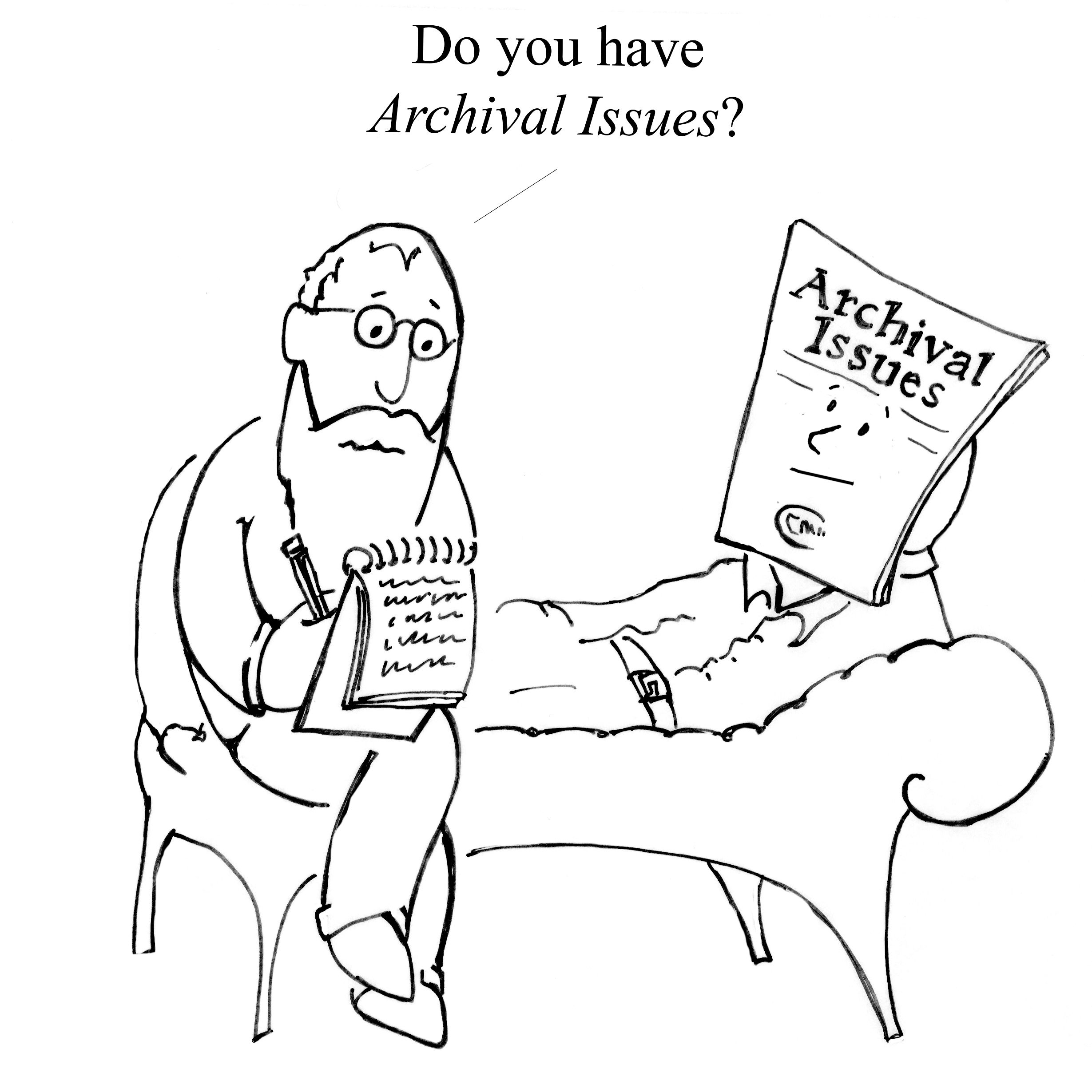Archival Issues
The Journal of the Midwest Archives Conference

About Archival Issues
Archival Issues, a semiannual journal published by the Midwest Archives Conference since 1975, has an international readership and is one of the premier outlets for archival literature. The journal focuses on the issues, challenges, and concerns confronting contemporary archivists. The Editorial Board welcomes submissions related to current archival practice and theory, archival history, and aspects of related professions of interest to archivists (e.g., records management, digital curation, oral history, etc.). We encourage a diversity of topics and points of view and will consider a wide range of potential submissions, including research articles, case studies, and opinion pieces. The journal also publishes reviews of current books and other resources about archival theory and practice. Although Archival Issues regularly publishes contributions from well-established professionals, the Editorial Board particularly encourages submissions from archivists who have not published previously.
Submissions
The Editorial Board reviews articles using a blind review process, in which manuscripts are anonymized by the chairperson before they are shared with the other board members. Authors are usually informed of publication decisions within six weeks and will be provided with a summary of reviewer comments. The Editorial Board and copy editors use the current edition of the Chicago Manual of Style as the standard for style. Additional guidelines for potential authors can be found in the current version of the MAC Style Guide.
To submit a manuscript to Archival Issues, or to view additional information about the submission process including acceptance criteria, copyright, and licensing, visit our online submission portal (https://www.iastatedigitalpress.com/archivalissues/submissions/)
If you have an idea for a submission you would like to discuss, please contact the Editorial Board Chair:
Adriana Harmeyer (2023-2025)
Archivist for University History
Purdue University
Email: [email protected]
Books and other publications for review should be sent to the Publication Reviews Editor:
Nicholas A. Pavlik
Manuscripts and Digital Initiatives Archivist
Bowling Green State University
Email: [email protected]
Subscriptions
Subscriptions to Archival Issues are included as part of membership in the Midwest Archives Conference. Membership also includes four issues of the MAC Newsletter and reduced registration fees for MAC’s two yearly meetings. Memberships are $20 per year for full-time students, $55 per year for other individuals, and $100 per year for institutions. Archival Issues is also available as a standalone subscription at $45 per year for individuals and $100 for institutions. Standalone subscribers receive digital copies of the journal but receive none of the other benefits of MAC membership.
*Please note that beginning in 2022, Archival Issues will be moving to a digital-only, open access publishing model, and print copies of the journal will no longer be produced.
Advertising Opportunities
Archival Issues accepts paid advertisements. Advertisers should contact the MAC Vendor Coordinator for current rate information.
Access to Back Issues
Archival Issues is available digitally through Iowa State University’s Digital Press (https://www.iastatedigitalpress.com/archivalissues/). This online version of the journal is open access and includes past issues of Archival Issues (1992– ) and its predecessor, The Midwestern Archivist (1976–1991). Beginning with volume 40, issue 2, articles published in Archival Issues have been assigned a Creative Commons Attribution 4.0 International (CC BY 4.0) license that will allow MAC to provide immediate online access to new issues of the journal without an embargo period. A full run of Archival Issues, except the three most recent volumes, is also available to JSTOR subscribers (https://www.jstor.org/journal/archivalissues).
Author Awards
Margaret Cross Norton Award
The Margaret Cross Norton Award recognizes the author of what is judged to be the best article in the previous two-year (four issue) cycle of Archival Issues.
New Author Award
To underscore its commitment to new authors, and journal presents its New Author Award to the best article published in the journal in the past two years (four issues) written by a previously unpublished author.
Author Name Change Requests
The Midwest Archives Conference is committed to responding to requests for author name changes with as few barriers as possible. Name changes are available to authors upon request, with no legal documentation required. In cases where authors wish to change their name for any reason following publication in Archival Issues, the Midwest Archives Conference will update all digitally published content, metadata, and associated records under our control to reflect the requested name change. To protect authors’ privacy, we will not issue a notice of correction for the name change or notify co-authors or editors. Please note that changes to printed copies of Archival Issues or digital versions of content disseminated via institutional repositories or other external platforms are beyond our control.
Authors who wish to update or change their name as previously published in Archival Issues should contact Adriana Harmeyer, Archival Issues Editorial Board Chair, at [email protected]. Requests will be addressed as quickly as possible in a respectful and confidential manner.
The Midwest Archives Conference is committed to collaborating with other groups to support systemic changes to ensure name changes are fully supported in academic publishing. To that end, we encourage all contributors to Archival Issues to utilize open systems like ORCiD which allow authors, researchers, and scholars to create profiles with associated unique, persistent identifiers independent of their legal names and/or institutional affiliations.
|